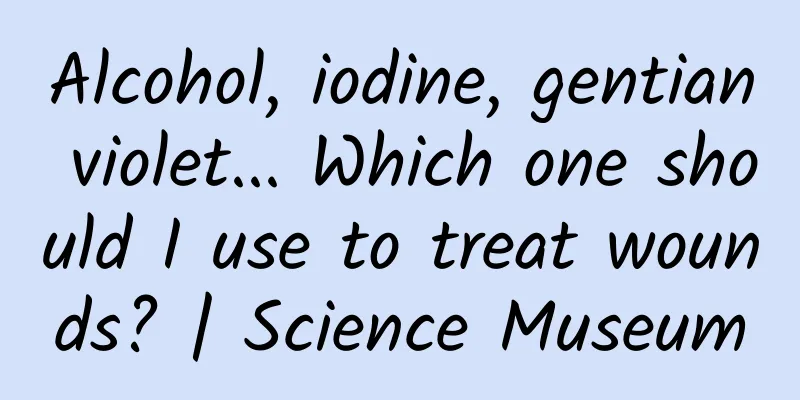Alcohol, iodine, gentian violet... Which one should I use to treat wounds? | Science Museum

|
Alcohol, iodine, gentian violet... Which one should I use to treat wounds? | Science Gallery In life, there are always some bumps and injuries, which may cause redness, swelling and abrasions at the mildest, or deep penetrating wounds at the worst. Improper treatment will not only cause infection, but also prolong wound healing time. Therefore, it is necessary to always have some disinfectants on hand. There are so many kinds of medicines in the pharmacy. How to choose the right topical medicine to treat wounds? Today, Pangke will take you to learn about some commonly used trauma-related medicines to help you make more appropriate choices when needed. Iodine and hydrogen peroxide These two drugs are widely used and can be used for general traumas such as contusions, abrasions, burns, frostbite, knife wounds , etc. Among them, the working principle of iodine tincture is to destroy the permeability of pathogenic microorganisms and bacterial protein exudation. At the same time, the iodine it contains can react with bacterial protease, making the bacteria inactive and dead. Iodine tincture has a killing effect on both bacteria and viruses. 1% iodine tincture can be used for disinfection of skin surface, and 0.5% iodine tincture can be used for disinfection of mucous membranes and wound surfaces . However, it should be noted that iodine tincture cannot be used together with mercurochrome . The ingredients contained in the two can easily react to form mercuric iodide, which is corrosive and toxic to the skin and is not conducive to wound healing. Hydrogen peroxide is an oxidizing disinfectant with strong oxidizing effect. After being used on wounds, the strong oxidizing ability produced by decomposition can damage bacteria, kill bacteria and achieve disinfection. The concentration of medical hydrogen peroxide is usually 3%, and there will be a slight burning irritation when used. In addition to cleaning minor wounds, hydrogen peroxide can also be used to treat deeper wounds. However, since the drug's bactericidal ability is not very strong, it cannot be used alone as a disinfectant. It is often used in combination with saline to clean wounds. It is important to note that gentian violet is not suitable for cleaning deep wounds, otherwise it is easy to cause pus under the scab. The drug can also easily cause skin pigmentation and damage the cornea, so special attention should be paid to avoid getting it into the eyes during use. At the same time, some studies in recent years have shown that the drug may have carcinogenic effects, so it should not be used on damaged wounds. Due to its strong oxidizing properties, hydrogen peroxide is most commonly used to clean wounds, ulcers, abscesses, infected necrotic tissues, and is especially suitable for deeper wounds with complications of infection. Erythromycin ointment is a common anti-inflammatory ointment. As an antibiotic gel, it can effectively kill bacteria in wounds and inhibit their growth and reproduction. It is mainly used for wound infection, small area burns and skin inflammation. It can also be used at the junction of skin and mucous membranes. The ingredients contained in the drug can moisturize the skin, protect the wound surface, and promote wound repair as soon as possible. Safflower oil is a traditional Chinese medicine preparation that has the effects of analgesia and blood circulation. It is often used for blunt contusions or mild burns of intact subcutaneous tissue. It cannot be used to disinfect broken wounds and oral mucosal tissues . When using it, you need to apply safflower oil drops evenly to the affected area and rub and massage with appropriate force. It is particularly important to note that safflower oil cannot be used within 24 hours of trauma, otherwise it will aggravate the trauma. Alcohol , also known as ethanol solution, is also a medium-acting chemical disinfectant. Its working principle is to dehydrate and coagulate bacterial proteins, causing bacteria to denature and die. Alcohol has a killing effect on bacteria and most viruses. 75% alcohol is routinely used, mostly for disinfection and sterilization of skin, objects and instruments. Alcohol is highly irritating and is usually not used for disinfection of larger wounds or wounds, or for disinfection of mucous membranes such as the eyes, nose, mouth, and vagina. At the same time, alcohol can easily cause poor local blood circulation and affect the absorption of inflammation, so it is not suitable for disinfection of chronic inflammation, or deep suppuration and bruises in the skin (purple skin color). Injuries are inevitable in life. For minor abrasions, we often have some disinfectants in our family medicine cabinets, which can be applied to prevent infection and promote healing. Of course, for serious injuries or deep wounds, you should go to the hospital as soon as possible and not delay. Creative team: China Science and Technology Museum New Media Team Review expert: Qu Bo, chief physician of general surgery, Yangtze River Shipping General Hospital |
>>: Do you think you are feeling sleepy during the spring? It may be your body's signal for help.
Recommend
What are the medicinal values of Acanthopanax senticosus seeds?
Nowadays, everyone should have a deep understandi...
The four most common types of pimples on the hands, face, and neck may not be ordinary skin diseases!
When it comes to HPV (human papillomavirus), dise...
Don’t ask! Milk tea is drunk in the afternoon, people go crazy at night
Who is the most popular beverage in the beverage ...
Half of the athletes are vegetarian, but they can't eat enough? How hard are the Paris Olympics trying to protect the environment?
The motto of the Olympics is "Higher, Faster...
Who is the biggest foodie underground? The soil animal food web tells you
Produced by: Science Popularization China Author:...
The efficacy and function of mountain ash leaves
As a traditional Chinese medicine, mountain ash l...
The efficacy and function of pine leaves
Pine needles have attracted our attention in our ...
Is there a "correct order" for bathing? 10 bathing taboos when the weather gets cold, you must know!
Now that the weather is getting colder, there are...
What are the effects and functions of Tibetan Ganoderma lucidum?
Many people don't know much about Tibetan Gan...
Why is altitude sickness fatal?
Why do people need oxygen? If oxygen inhalation i...
[Smart Farmers] Understanding the “Army Bugs”: Why is the Fall Armyworm so lethal?
What is the Fall Armyworm? The fall armyworm was ...
More than 300 expressions! Cats are not as cool as you think
Science and Technology Daily, Beijing, November 1...
The game is paused. What did you just say about Ma Mei? | Expo Daily
Your best "insider" in the scientific c...
Plantain is not suitable for people
Salt plantain seed is a very common Chinese herba...









